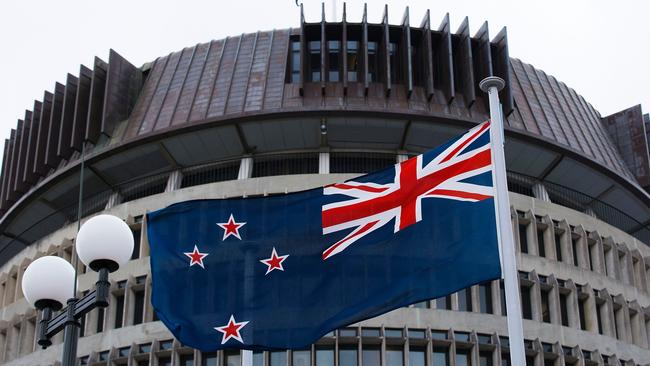ASX closes lower on US coronavirus escalation warnings
In a sign of the times, one analyst called the nearly 2pc drop a victory for the bullish, having expected a broader sell-off.

The Australian share market dropped again amid increasingly dire warnings about how bad the coronavirus crisis could get in the US.
But in a sign of the times, one analyst called the nearly 2 per cent drop a victory for the bullish, in terms of the market not suffering a much broader sell-off.
The S&P/ASX 200 benchmark index finished Thursday down 104.3 points, or 1.98 per cent, at 5154.3, while the All Ordinaries index dropped 102 points, or 1.93 per cent, to 5188.7.
“I don’t think it’s too bad, to be honest,” said Pepperstone head of research Chris Weston.
“It could have been a lot worse. It could have been quite an ugly session. It’s a win for the bulls.”
With the White House discussing a coronavirus death toll of up to 240,000 in the US, losses of up to 4 per cent were on the table, Mr Weston said.
All eyes are on America for signs of how serious the epidemic will get there, even as Australia copes with its own outbreak, Mr Weston said. “I feel that we’re going to grind from here, rather than have big impulsive moves, for the next week or so,” he said.
The consumer staples and energy sectors were the only winners on Thursday, with the financial sector leading the losers with a 4.2 per cent decline.
The big four banks were all lower after the Reserve Bank of New Zealand announced they wouldn’t be able to receive dividends from their Kiwi subsidiaries during the coronavirus pandemic.
NAB dropped 5.6 per cent to $16 and ANZ fell 5.3 per cent to $16.15. Commonwealth Bank shed 3.8 per cent to $61.24 as it announced it would make a one-time payment to all customers who are receiving a home loan deferral because of the coronavirus.
Westpac shares fell 4.3 per cent to $15.98 after revealing it would make Peter King’s interim chief executive appointment a permanent one.
Macquarie Group dropped 1.4 per cent to $88.06 while insurers QBE and Suncorp dropped 5 and 4.4 per cent, respectively.
Tech stocks collectively dropped 3.6 per cent, with Xero down 5.4 per cent, Altium down 4.7 per cent and WiseTech Global down 5.8 per cent.
In the heavyweight mining sector, BHP lost 1.3 per cent to $29.85 and Rio Tinto lost 1.1 per cent to $87.40, while Fortescue dropped 3.5 per cent to $9.99.
Goldminers were up, with Newcrest rising 4 per cent, Evolution climbing 5.1 per cent and Northern Star gaining 0.8 per cent.
Early education provider G8 Education soared 28.6 per cent to a nearly three-week high of $1.08 after the federal government promised to make childcare free for parents due to the coronavirus crisis and to provide relief to the sector.
International education placement company IDP Education soared 27.6 per cent to $14.75 after it announced the successful completion of a $225m institutional placement to strengthen its balance sheet.
Property companies Dexus, Mirvac, Vicinity Centres, and GPT Group were all down between 4.1 and 5.7 per cent.
Blood products giant CSL gained 0.4 per cent to $308.27, Sonic Healthcare fell 6.5 per cent to $23 and Ramsay Health Care dipped 3.8 per cent to $59.55.
Webjet gained 1.8 per cent to $2.78 after completing a similar equity raising for $231 million.
By the close of the ASX session the Australian dollar was 0.63 per cent stronger against the US dollar, buying US61.09c, having been earlier hit by a fresh bout of market jitters as grim forecasts for the length and depth of the coronavirus pandemic tested investor appetite for risk.
The Aussie managed to stay around US60.68c through the day, struggling to get momentum toward US62.15c touched earlier in the week..
The Antipodean economies have been hit hard by international travel curbs and strict social distancing, with Australia’s government warning restrictions could last for six months.
Gareth Aird, a senior economist at CBA, fears Australia’s economic output will shrink by a record 7.5 per cent in the second quarter, and by 3.4 per cent for 2020.
As a result, the budget deficit will blow out to around $72bn for the year to June, or 3.7 per cent of GDP, and to a staggering $155bn in 2020-21. To pay for all of this, government debt would balloon by $270bn by June next year and take total bonds outstanding to $790bn, or 40 per cent of GDP.
With a tidal wave of debt coming, analysts said it was just as well the Reserve Bank was operating in the secondary market to buy bonds. It offered to pick up another $2bn of 2024 to 2027 paper on Thursday, choosing to buy even though the market had already taken three-year yields to record lows of 0.219 per cent.
Traders said the market was testing how flexible the central bank intended to be about its 0.25 per cent target for three-year yields. The bank has said the target was not absolute and yields could trade “around” that level.
“We doubted the RBA would declare ‘mission accomplished’ and not come to the market,” said David Plank, head of Australian economics at ANZ.
“We think the decision to continue purchasing is very important,” he added “It provides ongoing support for the market and signals that the RBA wants to see further flattening in this part of the curve.”
AAP



To join the conversation, please log in. Don't have an account? Register
Join the conversation, you are commenting as Logout